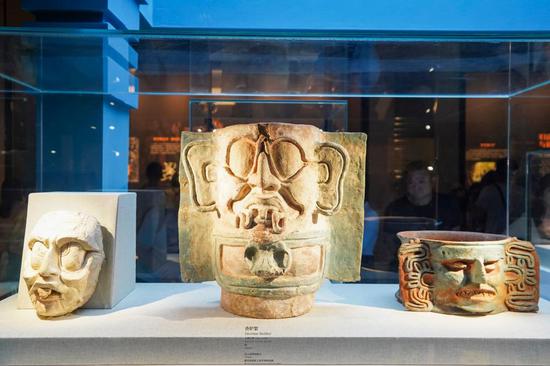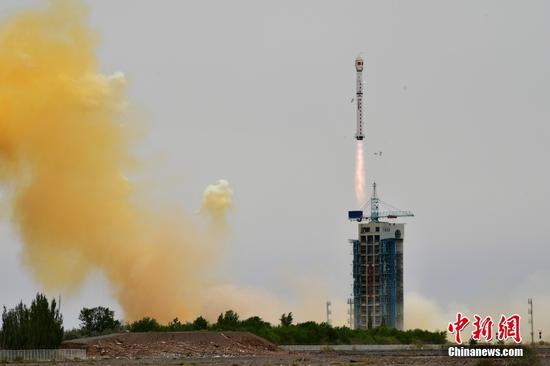Learning Chinese has become very popular in Central Asia, with the number of candidates taking the Chinese Proficiency Test — also known as the HSK — soaring to over 16,700 in 2024, a threefold increase compared with 2020, according to the test organizer.
"The HSK was first introduced in Central Asia in 2007. In recent years, the number of test-takers in the four Central Asian countries where the HSK is held — Kazakhstan, Kyrgyzstan, Tajikistan and Uzbekistan — has been skyrocketing, and the total number of candidates reached 143,000 as of the end of 2024," said Liu Xiaolong, deputy manager of Chinese Testing International Co, the test organizer.
About 50,000 people in the region have taken the exam in the past five years, reflecting a strong enthusiasm for learning the Chinese language, Liu added.
The HSK is a standardized test that assesses Chinese learners' language abilities, involving nine proficiency levels. As the official and most popular Chinese language proficiency test, the HSK is often required for university admissions, scholarships and job opportunities in China.
"The HSK is not only a gateway for studying in China, but also a prerequisite for securing jobs at local Chinese-invested companies," Liu said, adding that the popularity of the Chinese language in the region now rivals that of English.
In Kyrgyzstan, which has seen the highest number of HSK candidates, the number of test-takers has risen at an annual rate of 40 percent over the past five years, making it one of the countries with the fastest-growing number of HSK participants, according to Liu.
In 2024, approximately 9,400 people took the HSK test in Kyrgyzstan, with over 30 percent sitting for levels 4 to 6, indicating that more young Kyrgyz people are embracing opportunities with increasingly proficient Chinese language skills, he said.
The Confucius Institute at Kyrgyz National University, a major HSK test center in Kyrgyzstan, hosted 4,370 candidates last year. In the second HSK test this year, held on May 17, the institute accommodated more than 1,700 test-takers, marking a record high since its establishment in 2009, said Chen Zhiguo, director of the university's Confucius Institute.
The increasing numbers come with a more diverse demographic, from university students majoring in Chinese to civil servants, translators and those engaged in the trade sector with China, reflecting the widespread appeal of the Chinese language across all ages and professions, Chen added.
Similarly, at the Confucius Institute at Al-Farabi Kazakh National University in Kazakhstan, the number of HSK test-takers has more than quadrupled, from 266 in 2013 to 1,148 last year, according to Deng Hong, director of the institute, which is co-run by Lanzhou University in China.
"Interest in learning Chinese is booming in Kazakhstan for several reasons," she said. "China's higher education has risen to world-class standards, making the country a favored study destination for many students in Kazakhstan. In addition, the Belt and Road Initiative and the mutual visa exemption policy between China and Kazakhstan have boosted political, economic and cultural exchanges between the two countries, driving up demand for local Chinese-speaking talent."
Moreover, Chinese companies offer above-average salaries, making Chinese language skills a valuable asset for career development, said Deng, adding that with the rise of cross-border e-commerce and logistics, many professionals in the industry opt to encourage their children to learn Chinese.
"More and more schools in Kazakhstan are offering Chinese courses. Chinese language training institutions have been springing up rapidly, with over 100 in Almaty, the largest city in Kazakhstan, alone," she added.
Kanapiyauly Doskhan, a freshman at Al-Farabi Kazakh National University, has passed the HSK Level 3. "I'm very interested in Chinese culture, especially China's history and films. I find the language beautiful and useful, so I started learning it. The HSK allows me to gauge my Chinese proficiency and motivates me to study harder," he said.
This year, Doskhan won first prize in the "Chinese Bridge" Chinese Proficiency Competition for Foreign College Students in Kazakhstan.
"In the future, I hope to build more bridges of communication using Chinese. I want to share the message that the world is one big family, and that understanding and respect are the beliefs we all share," Doskhan, who is 18, said in his Chinese speech while participating in the competition at Kazakhstan's L.N. Gumilyov Eurasian National University in mid-May.

















































 京公網安備 11010202009201號
京公網安備 11010202009201號